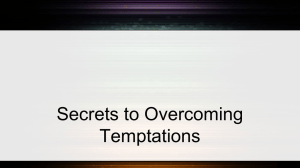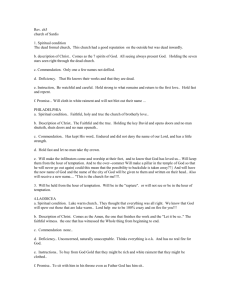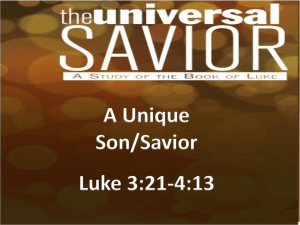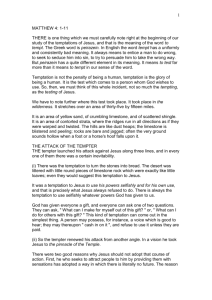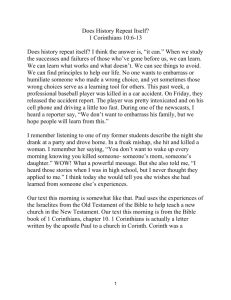Defeating Temptation with Desire
advertisement
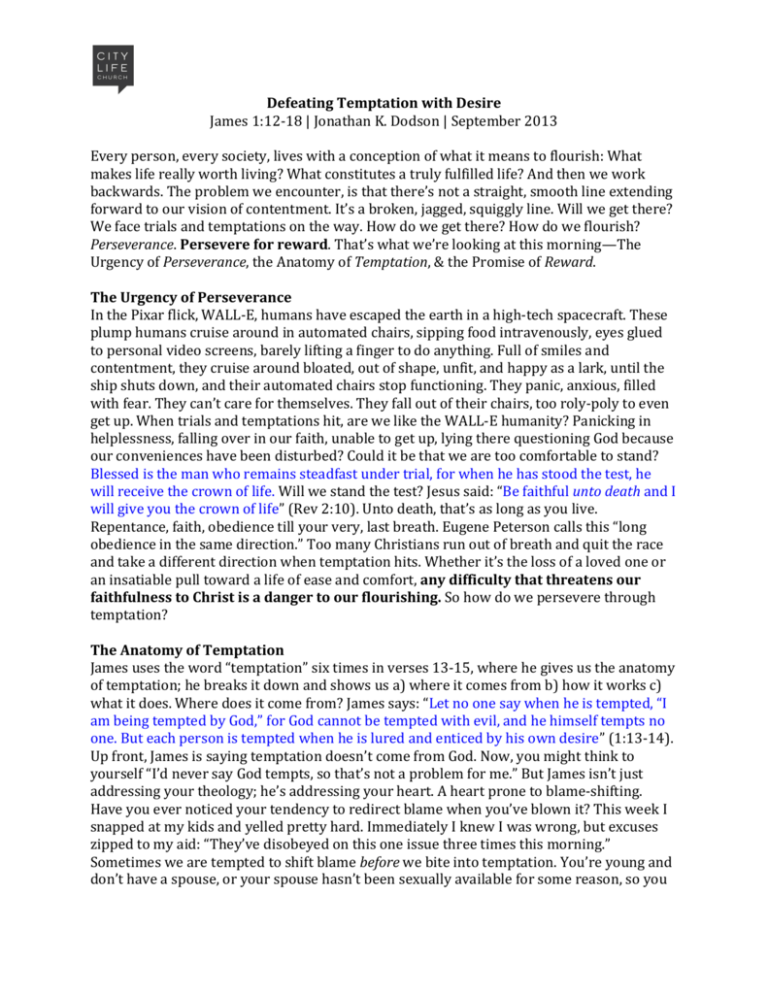
Defeating Temptation with Desire James 1:12-­‐18 | Jonathan K. Dodson | September 2013 Every person, every society, lives with a conception of what it means to flourish: What makes life really worth living? What constitutes a truly fulfilled life? And then we work backwards. The problem we encounter, is that there’s not a straight, smooth line extending forward to our vision of contentment. It’s a broken, jagged, squiggly line. Will we get there? We face trials and temptations on the way. How do we get there? How do we flourish? Perseverance. Persevere for reward. That’s what we’re looking at this morning—The Urgency of Perseverance, the Anatomy of Temptation, & the Promise of Reward. The Urgency of Perseverance In the Pixar flick, WALL-­‐E, humans have escaped the earth in a high-­‐tech spacecraft. These plump humans cruise around in automated chairs, sipping food intravenously, eyes glued to personal video screens, barely lifting a finger to do anything. Full of smiles and contentment, they cruise around bloated, out of shape, unfit, and happy as a lark, until the ship shuts down, and their automated chairs stop functioning. They panic, anxious, filled with fear. They can’t care for themselves. They fall out of their chairs, too roly-­‐poly to even get up. When trials and temptations hit, are we like the WALL-­‐E humanity? Panicking in helplessness, falling over in our faith, unable to get up, lying there questioning God because our conveniences have been disturbed? Could it be that we are too comfortable to stand? Blessed is the man who remains steadfast under trial, for when he has stood the test, he will receive the crown of life. Will we stand the test? Jesus said: “Be faithful unto death and I will give you the crown of life” (Rev 2:10). Unto death, that’s as long as you live. Repentance, faith, obedience till your very, last breath. Eugene Peterson calls this “long obedience in the same direction.” Too many Christians run out of breath and quit the race and take a different direction when temptation hits. Whether it’s the loss of a loved one or an insatiable pull toward a life of ease and comfort, any difficulty that threatens our faithfulness to Christ is a danger to our flourishing. So how do we persevere through temptation? The Anatomy of Temptation James uses the word “temptation” six times in verses 13-­‐15, where he gives us the anatomy of temptation; he breaks it down and shows us a) where it comes from b) how it works c) what it does. Where does it come from? James says: “Let no one say when he is tempted, “I am being tempted by God,” for God cannot be tempted with evil, and he himself tempts no one. But each person is tempted when he is lured and enticed by his own desire” (1:13-­‐14). Up front, James is saying temptation doesn’t come from God. Now, you might think to yourself “I’d never say God tempts, so that’s not a problem for me.” But James isn’t just addressing your theology; he’s addressing your heart. A heart prone to blame-­‐shifting. Have you ever noticed your tendency to redirect blame when you’ve blown it? This week I snapped at my kids and yelled pretty hard. Immediately I knew I was wrong, but excuses zipped to my aid: “They’ve disobeyed on this one issue three times this morning.” Sometimes we are tempted to shift blame before we bite into temptation. You’re young and don’t have a spouse, or your spouse hasn’t been sexually available for some reason, so you excuse yourself for viewing porn or some lustful activity. The blame for your sexual lust shifts from self, ever so subtly. Beneath these excuses, lies a finger pointing up at God’s providence—no sexual partner. If God had given you an available husband or wife, well, you wouldn’t have sinned. James is saying, “It’s not God’s fault you are tempted; it’s your fault; it’s your desires being lured and enticed in the wrong direction.” Anger and lust bust up the line to contentment. So how does temptation work? For years I felt guilty if I even had a temptation cross my mind—a judgmental or lustful thought, until my mid-­‐twenties, when I was reading the Bible more closely. Interestingly, I discovered that Jesus makes a distinction between temptation and “entering into temptation.” In the garden of Gethsemane with his disciples, he charged them: “Watch and pray, that you do not enter into temptation” (Matt 6). When he teaches us to pray, he says “Lord, lead us not into temptation but deliver us from evil” (Matt 26:41). There’s a difference between being tempted and entering into a temptation. What? It’s one thing to recognize the enticement to snap or lust, but quite another to enter into the enticement. [We can hear temptation knocking, but don’t have to open the door.] So when does one cross from temptation into sin? James: “each person is tempted when he is lured and enticed by his own desire. Then desire when it has conceived gives birth to sin.” We sin when our desire is lured away. So is the way forward denial of desire? There’ certainly a Christian tradition that advocated that, but Paul uses the same word in Philippians 1:23 to say his desire is to depart and be with Christ. So desires can be good or bad. Augustine would say we are essentially desiring beings; not essentially rational beings. In fact, we primarily act out of desire not knowledge. Let’s say you want to get healthier so you go on the Paleo diet. You read all the books and blogs and have it down to a T, what you can and cant eat. You know how it will positively affect your digestion, hormonal balances, and overall sense of health. But then along comes that slice of chocolate cake. Pretty sure cavemen didn’t have that. You know you shouldn’t eat it, you know it will wreck your hard won diet, but all the knowledge in the world cant help you. Your beliefs aren’t enough. You have to not want it or you have to want better health more than you want the cake. Knowledge is not enough. We are not, as James Smith puts it, “static containers for ideas and beliefs.” Rather we are lovers, and our loves pull us to act in certain ways, develop certain relationships, value certain things. Our desire has a direction, a target, a telos. Temptation works by luring our desires toward the wrong destination. It’s wanting something so much, you’re willing to go against what you know is best. When I worked in a church in Minneapolis there was this cautionary tale that floated around about a missionary to Thailand, who was a husband and father. He abandoned his wife and children for a Thai lover. People often said how could he do that, didn’t he think about the damage it would do to his wife, children, and church? The problem isn’t that he didn’t think; it’s that his desire ran uncontrolled in the wrong direction. We enter temptation when we set our affection chiefly on any destination other than Christ. So what we do with our desires between now and the moment of temptation make a difference. John Owen: “While it knocks at the door, we are at liberty; but when any temptation comes in and parleys with the heart, reasons with the mind, entices and allures the affections…we enter into temptation.” We bite down on the chocolate cake. The way out of temptation, then, isn’t how close is too close, how far is too far, how much is too much? That’s all rational. Rather, to escape temptation, the direction of our desire needs to change. The heart needs a new target. Temptation works by enticing, luring and seizing upon our desires. The language comes from fishing. You see the bait dangling there, the line is pulled a few times, bobber goes up and down, and then you clamp down on it, and the hook is in the mouth—temptation gives birth to sin and sin to death. On the other side of your anger or lust, you don’t feel any better. A hook in the mouth is painful. The moment we see the bait wriggling is a sign we need a new target, a better telos, a different direction. Temptation appeals to our desires, beckoning us to travel to the wrong destination. It deceives the heart “Do not be deceived my beloved brothers.” The Promise of Reward How can we hear temptation but refuse to invite her in? How do we get our desires going in the right direction? Three ways that work together: a new habit, community, and target. Leave one out and we’re just asking for the hook. Habits. Although we are creatures of desire, our desires lead us to form habits. If you really love sleep, you probably have a habit of sleeping in. If you really love being healthy, then you form a habit of eating well. Habits express and reinforce desires. [Graphic] You keep eating healthy, you love eating healthy. You may start spending more time, money, and energy on your love, forming new habits at whole foods, food blogs, and so on. The same thing is true for our chief love— Christ. If you don’t have habits that cultivate your desire for Christ, you wont grow in desire for Christ, and as a result, other desires will grow up alongside it and choke him out. You don’t become steadfast overnight. It comes with perseverance through temptation, which relies grace-­‐shaped habits that draw you close to your chief joy. I have a habit of mediating on Scripture each week in order to encounter Christ, to have my desires reoriented to what is truly fulfilling. This week I was taken by the notion that the crown of life is promised to those who love God (not to those whom God loves). Faced with several lustful temptations, I recalled this promise, I exhorted my heart to love God more than tightly dressed women at the gym. The habit Scripture reading gave way to a better love. Of course habits, alone, are not enough. James says: “Do not be deceived my beloved brothers” (1:16). Avoiding temptation requires community, brothers, to point us to a better love. I’ve been reading through John Owen’s On Temptation and Sin with my two fight club friends over the past few months. Man, its sharpened my eye for temptation and my love for Christ. When we come together, Taylor or Austin often have a perspective on the text or a story that helps me see Jesus more clearly, even hearing them repent and return to Jesus has a renewing affect on me. The habit of joining with them around repenting and rejoicing is a grace. If you’re not in a Fight Club, why? Is it pride that holds you back? Don’t want people to see the real you, no one is worthy of your trust, you can do it alone. I came across in our reading: “Confidence of any strength in us is one great part of our weakness.” Confidence in yourself is the beginning of weakness. Acknowledgement of your weakness can be the beginning of strength. Finally, we need a new target. The grace of new habits, strengthened by community, are not adequate alone. We need a titillating telos. We need to envision the promises of a better country, where a perfect Father lives, dispensing better counsel than any friend can give. We need a sanctified imagination that looks up to the Father of lights, an image of the Creator, consistently giving good gifts—better than sex, control, power, relief. He doesn’t change or shift; he’s not flaky. He’s consistently good, consistently true, consistently enough. His love never fails. Even in trial and temptation, he’s good; he’s there beckoning you to deeper joy than perfect circumstances. The reason God can’t be tempted is because there is nothing outside of him that is more appealing than himself, he is fully satisfied and content in the telos of the trinity. He has a perfect target for his desire. Do you? In the moment of temptation, we need a better target. To get there we need a habit and a community. Set your imagination on the Father who has open arms, sends you Jesus, the very wisdom and beauty of God. Persevere for reward. Blessed is the one who perseveres, and he will receive the crown of life. Here’s a better target. This probably isn’t a gem-­‐studded crown. Instead, we’re meant to see the athlete, who has trained himself, run the race, and received the Greek wreath of victory as he crosses the finish line. As he receives the promised imperishable wreath (1 Cor. 9:25), he exults in the reward of undying favor and life with God. The shouts of Hallelujah and never-­‐ending joy are meant to beckon us forward, into the new creation. Set your heart on this, not a bowl title. Do this and you’ll be who you already are—a firstfruit of the new creation. One born from the future, living in the present, can’t help but be a royal son or daughter, who enjoys the crown of God’s affection, shouts halleluiahs with God’s people, and forms grace-­‐shaped habits. Persevere, but persevere for reward.
